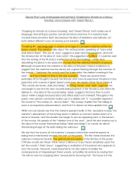Write a critical appreciation of Mending Wall exploring how far you think that Frost uses his observations of a simple rural event to make a significant conclusion.
Write a critical appreciation of Mending Wall exploring how far you think that Frost uses his observations of a simple rural event to make a significant conclusion. In Mending Wall, Frost assumes the character of a farmer who has the task of rebuilding a wall which separates him and his neighbour. The poem can be viewed from two very different angles, both which raise very different conclusions. At first glance, the poem seems harmless and innocent, whereby Frost's character questions the need for a wall to be in place - a wall that he feels symbolises the barriers of communication that people put up around themselves and other people. This idea of innocence is repeated throughout the poem. He appears to see that repairing the wall as the labour of love, gaining no reward from his efforts, but continuing anyway. He begins by fantasizing about how the wall has become broken, creating naive images in his head, such as the idea of rabbits breaking it during the spring - the 'mischief in [him]', and gives the sense that he believes that repairing the wall is a game to him; in line 21, he states that it is "just another kind of outdoor game" and incorporates the childish idea of magic into his 'game' - claiming that he needs to use "a spell to make [the stones] balanced". In this simple and gentle view of rebuilding the wall, comes an element of sadness, when Frost must
The Road Not Taken by Robert Frost relates on both a literal and metaphoric level to the concept of a journey.
Amanda Atlee The Road Not Taken The Road Not Taken by Robert Frost relates on both a literal and metaphoric level to the concept of a journey. The poem depicts one man's journey throughout his life, the choices he made and the road he travelled. The Road Not Taken is a poem with universal relevance about a journey that every person takes. Here is a first person narrative tale of a monumental moment in the speaker's life - Frost can be considered the speaker. Frost is faced between the choice of a moment and a lifetime manifested in his poem. Frost presents the idea of an individual facing the difficult unalterable predilection of a moment and a lifetime. This idea in Frost's poem is embodied in the fork in the road, the decision between the two paths, and the speaker's decision to select the road not taken. Frost effectively conveys his theme and meaning through the use of numerous techniques. These techniques include simple yet powerful imagery, word choice and rhyme and rhythm. Also vital in the effectiveness of this poem is the use of symbolism and the extended metaphor present. Literally this man is a traveller standing at the divergence of two roads. Metaphorically this man is in the 'autumn' of his life, suggested by the "yellow wood" and has come to the crossroads where decisions have to be made to determine the rest of his life. The subject chose "the road not
Discuss Frosts use of language and setting in Stopping by Woods on a Snowy Evening and compare with Desert Places.
Discuss Frost's use of language and setting in 'Stopping by Woods on a Snowy Evening' and compare with 'Desert Places'. 'Stopping by Woods on a Snowy Evening' and 'Desert Places' both make use of language and setting to portray certain emotions and how the narrator feels towards these emotions. Both encompass the idea of loneliness and solitude, yet both deliver different ways of viewing such isolation. 'Stopping By' uses language to create an image of complete isolation within the snowy woods. The narrator talks about the setting fondly, speaking of "easy wind and downy flake". The use of 'easy' suggests a quiet and tranquil place, and with the introduction of the idea of 'easy wind', this suggestion is fortified. It could be said that the setting of the Woods is a reflection of his own feelings - whilst he is describing the place to be peaceful, we see that the narrator himself is at peace. Although we perceive the narrator to be alive at this point, there is evidence to suggest that the narrator may be dead, just a ghost floating through the memory of the woods - "between the woods and the frozen lake, the darkest evening of the year" - as if he is frozen in time to this one scenario. There are several other examples of his thoughts towards the Woods, and how he perceives the place to be peaceful, with a sense of great beauty and awe. He clearly states this in stanza 4;





